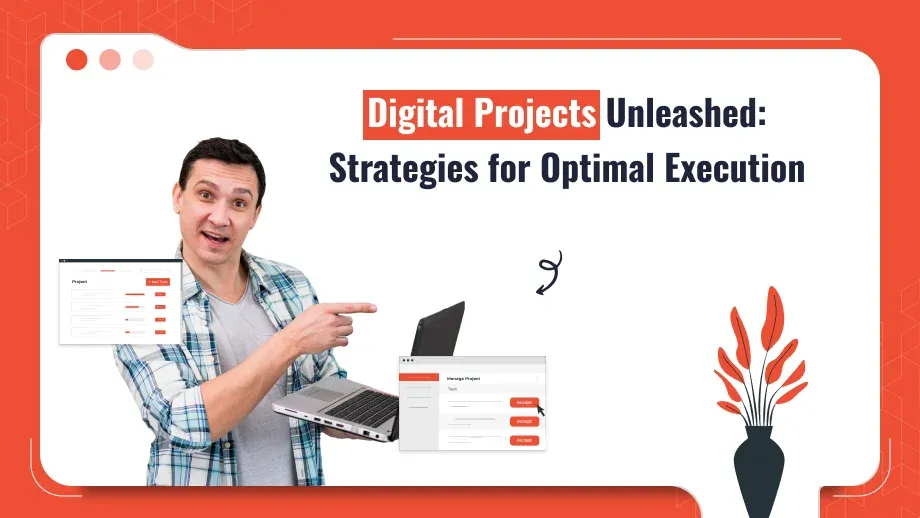
In the current digitally-driven world companies are increasingly taking on initiatives to improve their processes to engage their customers and spur innovations. Projects span a range of domains that range from software development to web design to marketing strategies and analysis of data. The achievement of any project depends on a well-managed management system, strategic design, and the use of appropriate instruments.
This blog will discuss the importance of projects, what is a digital project, discuss the essential aspects of successful project management, examine the job of a project manager, highlight the common issues that organisations face and provide how to achieve a successful outcome.
What is a Digital Project?
Digital projects encompass every initiative that makes application of technology to meet specific goals. The projects may vary in both scope and sophistication and range from basic projects like putting together an advertising campaign on social media or constructing an extensive e-commerce platform.
The characteristics of projects are the use of technological advancements and data-driven strategies. The majority of them involve multiple stakeholders that include project managers, marketers, designers, developers and customers, all cooperating to accomplish an agreed-upon objective.
Digital projects are classified in a variety of categories, such as:
- Software Development Projects: Building platforms, software or instruments that meet certain needs or challenges.
- Web Development projects: The creation and maintenance of the webs to generate more web presence and engagement of users.
- Digital Marketing Projects: Building on the methods of advertisements or service offers through digital means like social networking, email, and search engines.
- The Data Analytics projects: Analysis of data for better knowledge and decision-making with a strategic strategy.
The Role of a Digital Project Manager
Digital project managers are in charge of overseeing the plan, the execution and finalization of tasks. It requires a mix of knowledge about technology, management skills, as well as the capacity to think strategically. Project managers work closely with teams from all possible functional spectrums so that the projects are completed within time, aligned with the scope, and within the budget.
Key Responsibilities of a Digital Project Manager:
- Scheduling and planning: creating precise plans for the project that define schedules, tasks, and the necessary resources in order to meet the project’s goals. Making the Project Purpose Statement that outlines the goals and directions of the project.
- Collaborate with a Team: Getting insights from a marketing agency can also provide valuable data and strategies to enhance the project’s reach and effectiveness.
- Manage Budget: Be in charge of the project’s budgets and make sure the costs stay within the allocated budget.
- Risk Management: Show or recognize potential risk and develop mitigation strategies that reduce their effects on the success of your project.
- Stakeholder communication: Monitor change and keep aware of the projects or challenges and any changes.
Why Are Digital Projects Important?
For many reasons, digital activities are important in today’s business environment.
Enhancing Operational Efficiency
Digital projects simplify procedures and boost efficiency. With the help of technology, businesses can automate repetitive jobs, cut down on manual work and increase efficiency. This efficiency results in lower costs and lets teams focus on more valuable tasks.
In particular, automating the payroll process using payroll HRMS software can help save time and cut down on errors, which allows HR departments to focus on their strategic goals instead of administration tasks.
Launch Your Digital Project – Embrace Innovation Today!
Define objectives, strategies, and tools to ensure success from the outset.
Meeting Customer Expectations
In the digital age the customer expects seamless experience as well as quick availability of information. Digital technology allows businesses to provide an engaging experience for customers, be it through apps for mobile devices, or personalised advertising campaigns. It is essential to meet these requirements to maintain customer loyalty and satisfaction.
A digital marketing project manager has to ensure that a brand new online store offers a simple, speedy, quick and efficient user experience on all devices in order to increase user satisfaction and boost sales.
Driving Innovation
Digital projects encourage innovation through encouraging companies to investigate the latest technologies and methods. When it comes to implementing the latest software technologies or exploring the use of data analytics, these initiatives could lead to revolutionary strategies and innovations that drive companies ahead.
For instance, the firm may opt to install a digital programme management that introduces machine-learning algorithms and therefore improves on the management of supply chains. Resultant benefits saved costs and a better quality of service.
Data-Driven Decision Making
Organizations can leverage the abundance of data generated by digital projects to make well-informed decisions. Data-driven approaches help detect trends, assess results, and make informed decisions about the future of initiatives. With the help of analytics, organizations can improve their strategy to achieve greater results.
A digital marketing team might look at the metrics used to measure campaign performance in order to improve targeting strategies, which can lead to greater rate of conversion and a better return on investment.
Improving Collaboration and Communication
Digital projects facilitate greater collaboration across team members, regardless of where they are. By using digital tools and platforms that allow teams to communicate instantly, share data and work together on projects easily. The improved communication improves efficiency and helps create a stronger working environment.
Project management software lets remote teams keep track of developments, exchange documents and send out updates to ensure that everyone is on the same page and well-informed.
Key Features of Effective Digital Project Management
For successful management of digital initiatives, businesses must focus on a few essential aspects:
Clear Objectives and Scope
Determining the clear goals and defining the scope is crucial to success in managing projects. The organization should set precise, quantifiable goals that are aligned with their overall plan. An established scope can avoid scope creep and assures that projects stay in the right direction.
Utilising a Requirements Gathering Template will facilitate discussion as well as the documentation of objectives for your project to ensure that the stakeholder’s requirements are accounted for and taken care of.
Agile Methodologies
Many projects can benefit from agile methods that emphasize flexibility and aptitude. Through breaking down projects into manageable, smaller projects (sprints) teams are able to react quickly to change and provide incremental benefit. This approach improves collaboration as well as allows for constant advancement.
A software development team may employ agile sprints in order to publish frequent updates, which allows more rapid feedback from users and modifications.
Collaborative Tools
The use of collaborative tools is essential to ensure effective management of projects. Software like project manager communications apps, project management software, as well as service for sharing files help to collaborate among teams, improve processes, and increase transparency. They allow teams to effectively work regardless of places.
Software such as Slack to communicate and Trello for managing tasks ensure that teams are connected and well-organized making sure that everyone is in the same boat.
Regular Monitoring and Reporting
Monitoring and reporting on a regular basis is essential to track the project’s progress and results. Project managers should establish key performance indicators to gauge the success of their project and update the stakeholders on the status of the project. Such an approach really makes everyone accountable, as transparency leads to the coordination of everyone in terms of the project’s objectives.
As an example, the weekly reports on status can show the tasks that have been completed, milestones to be reached or roadblocks to be addressed.
Feedback Loops
Implementing feedback loops in the process of managing projects lets teams collect input from users and other stakeholders. Feedback loops regularly help uncover areas that could be improved and address any issues that may arise and improve the direction for the project. Involving stakeholders in this manner increases the chances of a successful project.
In the case of the testing of users in a revamp can give valuable insight into the design version.
Common Challenges in Digital Project Management
Although projects can bring many benefits, companies may face challenges when they are being implemented. These are the most common issues and solutions to get over these challenges:
Lack of Clear Objectives
One of the major issues in managing projects is the lack of clearly defined targets. Without clear goals team members may be unable to prioritise tasks and evaluate the success. To overcome this, businesses need to invest in developing clearly defined project goals, and ensure that all stakeholder groups are in sync.
Rapid Technological Changes
The digital world is always evolving because there’s always new tech emerging every other day. It may reach a point where the teams find it impossible to keep up with these developments when doing work on a project. The organization should be a proponent of continuous education and keep abreast of the latest trends in their industry to adjust their project accordingly.
Resource Constraints
Digital projects usually require special capabilities as well as resources. Yet, some organizations might face challenges in the area of finances, staff and technology. To overcome this issue companies can prioritize the allocation of resources, think about outsourcing some tasks, or even invest in education for current team members.
Ineffective Communication
Ineffective communication could lead to miscommunication and slow down the process. It is essential to establish clearly defined communication protocols and channels for team members to ensure they have the ability to effectively share information. regular check-ins and reports can aid in maintaining alignment and addressing possible issues in the early stages.
Resistance to Change
The employees might be reluctant to embrace the latest technologies or procedures that are introduced by initiatives. To address this issue companies should highlight the advantages of digital initiatives, offer instruction, and engage workers in decision-making processes for a greater sense of commitment.
Best Practices for Successful Digital Project Management
To make the most of digital technology, companies must consider these best techniques:
1. Define Project Goals Clearly
Prior to beginning a project companies should be clear about the goals and objectives of their projects. Clarity will help guide the direction of the project and teams to be more aligned with their organization’s priorities.
2. Adopt Agile Methodologies
Implementing agile methods can increase the flexibility and speed of projects. Projects must be broken down into manageable phases, which allows teams to adjust to changing conditions and provide value incrementally.
3. Utilize Collaboration Tools
Collaboration tools that are implemented can improve collaboration and improve the efficiency of teamwork. Project manager software and messaging applications and file sharing platforms enable instant collaboration, and make sure that everyone is updated.
4. Encourage Continuous Feedback
The creation of a culture that is constantly feedback helps teams gather feedback from users and stakeholders. Regular check-ins and feedback sessions can help pinpoint points for improvement, and help ensure that projects are on the right track.
5. Leverage Data Analytics
Data analytics may provide important insights into the performance of projects. Businesses should examine their data frequently to discover trends, assess performance, and make educated choices about the next steps.
Conclusion
Digital is essential to organizations that want to be successful in the increasingly competitive market. Through the effective management of these projects organizations can increase performance, exceed the expectations of their customers, boost innovations, and adopt decision-based data.
Making the investment in digital project management tools and adopting best practices in managing projects can be a significant contribution to the overall success of your organization. Through overcoming the obstacles and applying the strategies laid out in this article, companies will be able to guarantee that their projects yield impressive results, and propel their company to the next level.
If a competent project manager is in charge, businesses are able to maximize the value of their digital projects and meet their objectives. Making use of structured methods, for example making a Project Scope Management strategy using the Requirements Gathering Template could also improve the clarity of projects and focus.






